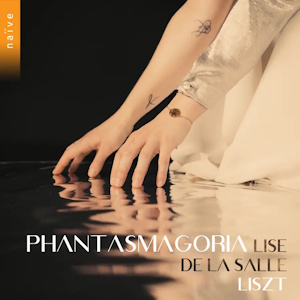
Franz Liszt (1811-1886)
Phantasmagoria
Piano Sonata in B Minor S.178 (1852-3)
Cantique d’amour from Harmonies poétiques et religieuses S.173 No.10 (1848-1853)
Réminiscences de Don Juan, Grand fantaisie after Mozart S.418 (1841)
Lise de la Salle (piano)
rec. 2024, The Studio Teldex, Berlin
Naïve V8602 [58]
I really enjoyed Lise de la Salle’s previous Liszt disc (Naïve V5267 review) and was happy to now have her add the B minor Sonata and the huge Don Juan fantasy to her impressive discography. It is the second disc to come my way with a title and booklet discussion that points to the Faust legend and associated magical connotations. The last was Sorcellerie, including a two piano version of the sonata (Alpha Classics 1083 review) and now De la Salle adds Phantasmagoria to that narrative. She sees an autobiographical element to the Sonata, an idea that makes more sense than a programmatic concept that Liszt always denied. Certainly the contrasting, even conflicting sides of Liszt’s personality are brought together in the work, the diabolical rhythms and fervent lyricism that Jennifer Lesieur describes in her booklet notes Such an important work in his canon was always going to reflect Liszt’s persona, conceived over many years of his life and the result of experiences, experiments and creativity that formed steps along the way; works such as the Grosses Konzertsolo, showcase of the touring virtuoso, his love of Schubert’s Wanderer fantasy whose transformation of themes resonated so deeply for Liszt and even the opera fantasies that gave rein to his acutely imaginative use of melody, texture and figuration. De la Salle is tumultuous in the virtuoso writing without feeling the need to over egg the devilry. She shapes the lyrical elements beautifully and judges tempo and contrast to a tee; I could listen to the dolcissimo con intimo sentimento and the towering climax that follows over and over, revelling in De la Salle’s deeply rich sonorities. This is a fabulous performance and well worth the wait. She delves into Liszt’s Harmonies Poétiques et Religieuses next and the not so familiar Song of love, the final item that tends to join its fellows in the shadow of Funérailles and Bénédiction de Dieu dans la solitude. This is Liszt in full heart-on-sleeve outpouring of emotion and perhaps a little embarrassment about such grandiose sentimentality leads pianists to avoid it. This is a real shame because, especially when played to its strengths as De la Salle does, it is an exceptional work. The melody is rather simple but leaves great scope for expression and adaption, allowing Liszt to explore keys and textures and to achieve a wonderfully graded crescendo of passion, perfectly crafted by De la Salle. I’ve heard this piece before but this performance has really opened my ears to its wonder.
This emotionally charged hymn to God is an oasis between the conflicts and ultimately tranquil concord of the Sonata and the sensuous indulgence and sheer glittering flamboyance of the Don Juan fantasy. Again it is the depth of De la Salle’s approach that impresses; she has all the requisite technique and spirit to play it to its fullest but doesn’t play it as a feast purely for the fingers. There is a clear distinction between the tempestuous drama of the opening, Don Juan’s overwhelming character and his doom inexorably entwined, and his quick turn around, getting into character to woo and charm Zerlina, the duet la ci darem la mano so deeply understood by Liszt with both voices clearly heard. Everything that Liszt asks for is given; con grazia and brioso in the la ci darem variations and plenty of tempestuoso as the mood darkens towards the outrageous and treacherous Finch’han del vino. De la Salle gives us the extended alternative cadenza that Jorge Bolet used to play and which brings more of Don Juan’s fate into the spotlight and in general her gigantic interpretation is a match for the drama that Liszt so imaginatively and concisely condensed into just twenty minutes of music. In wonderful sound this is a Liszt recital to savour and a worthy follow up to her earlier disc.
Rob Challinor
Buying this recording via a link below generates revenue for MWI, which helps the site remain free




















